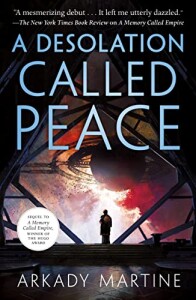 “I am still learning how to write a novel,” Arkady Martine says in the Acknowledgements at the back of her second one – and second in the Teixcalaan Empire series – A Desolation Called Peace. Seeing as how her first, A Memory Called Empire won the Hugo award for best novel in 2020, in other hands that could come off as a humble brag, but it’s as sincere as can be. And from my perspective, Martine seems to be learning by leaps and bounds, or perhaps interstellar jumps, because as good as the first was, A Desolation Called Peace exceeds it in nearly every way. It’s that good. It received the Hugo for best novel in 2022. It’s that rare thing: a sequel that is lightyears better than its predecessor.
“I am still learning how to write a novel,” Arkady Martine says in the Acknowledgements at the back of her second one – and second in the Teixcalaan Empire series – A Desolation Called Peace. Seeing as how her first, A Memory Called Empire won the Hugo award for best novel in 2020, in other hands that could come off as a humble brag, but it’s as sincere as can be. And from my perspective, Martine seems to be learning by leaps and bounds, or perhaps interstellar jumps, because as good as the first was, A Desolation Called Peace exceeds it in nearly every way. It’s that good. It received the Hugo for best novel in 2022. It’s that rare thing: a sequel that is lightyears better than its predecessor.
We’re still following Mahit Dzmare, Ambassador to Teixcalaan from Lsel Station. She’s back at Lsel following the dramatic climax of A Memory Called Empire, licking her wounds as it were and wondering what it means that she’s still the ambassador. But Mahit is still a disruptor, one who just by being herself is a catalyst for change in her environment, so we know her quiet life in Lsel won’t last. We also know it won’t last because there’s a war going on.
Teixcalaan (and Lsel) are alarmed about the presence of mysterious and violent aliens a jump or two away from Lsel. A lot of ships have gone missing. The alien ships seem to appear out of nowhere without using a jump gate, and have no trouble destroying Teixcalaanli scouts and fighters. At least one entire planet, a remote mining outpost, has also dropped off the grid.
One of the outcomes of A Memory Called Empire was that Mahit brokered an agreement that Teixcalaan would be allowed free passage through Lsel space to fight these aliens, as long as they give up on annexing Lsel. But there’s still a lot of distrust and outright hatred of Teixcalaan among the leaders of Lsel’s council, at least one of whom has it in for Mahit.
As interesting a character as Mahit was in A Memory Called Empire, Martine has expanded the cast of characters through whose eyes we see the unfolding of this installment, and greatly increased its scope. There’s Three Seagrass, with whom Mahit was on the verge of developing a relationship beyond Ambassador and Liaison. And Eight Antidote, the 11-year-old who is a 90 percent clone of the previous emperor and now sole heir to the throne. And Nine Hibiscus, the yaotlek (something like an admiral) leading Teixcalaan’s military expedition against the aliens.
One of the most mysterious things about the aliens is how they communicate. Finally a fighter is able to record the sickening noise they may use to talk to each other, and when Nine Hibiscus sends a message to the Information Ministry asking for translation help, Three Seagrass leaps into action. She finagles a ride to Lsel, grabs Mahit out of the clutches of hostile Councilors, and the two of them head to the battle front.
Martine juggles the various settings and characters, and coordinates the actions taking place in each, in a way that keeps the plot buzzing along, and this reader at least was able to follow along with ease. We flit back and forth from the highly precocious Eight Antidote as he learns about various palace intrigues and the rivalries among the government branches, to the bridge of Nine Hibiscus’s interstellar battleship as she wrestles with competing impulses for action and diplomacy, to the increasingly fraught relationship between Mahit (and her imago line) and Three Seagrass as they race against time to learn how to communicate with the seemingly monstrous aliens. Martine creates and sustains one of the longest action sequences I’ve read in quite some time. There are page-turners and there are absolutely gripping page-turners you can’t put down even to eat or sleep, and this is one of the latter.
With her first two novels, Arkady Martine has emerged as the author of some of the best military/political science fiction of the era. Her memorable and not always likable characters capture and hold our imaginations as they navigate a host of big meaning-of-life questions in life-or-death situations. This is space opera for the ages. I have high expectations and many questions that I hope are met in the next installment. Like, I wonder if I’m right about the kittens?
(Tor, 2021)
